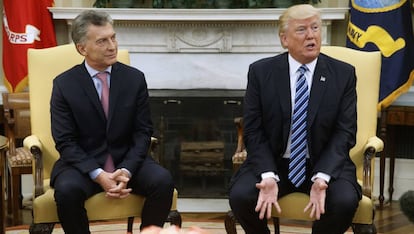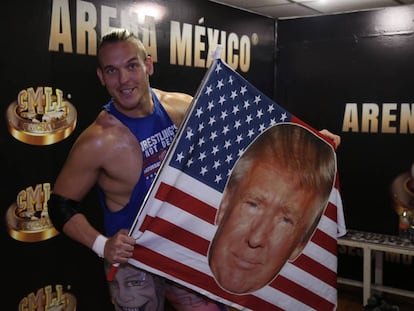Trump: fake news even on the golf course
For the US president the important thing is to win, even when the facts suggest otherwise

For Donald Trump the important thing is to win, or to believe that he has won, or to convince himself that he has won even when all the facts suggest otherwise. When it comes to golf, a sport to which President Trump devotes more time than he does to governing, he shows the same predilection for fake news and alternative facts as he does when it comes to politics.
Around 30 years ago he played a round with the current president of Argentina, Mauricio Macri, on a course near New York. Macri, who today is visiting Trump in the White House, was in the US on a business trip representing his family firm. The plan was to do a deal with Trump’s company.
They went out to play and Macri quickly saw that he was a much better golfer than his rival. Winning was going to be easy – but perhaps not a good idea. Like any proper Argentine, Macri had sized up Trump psychologically. The future Argentine president figured out that the future US president was going to be very upset if he lost, which could have had a negative effect on his principal mission, which was to sign a real estate contract with him.
The young Macri willfully fluffed a couple of easy putts, throwing away the game and handing Trump the gift of being able to declare himself the winner
With a few holes left to go, Macri was a couple of strokes ahead. Recognizing, in spite of himself, that he had to make a sacrifice for the cause, he deliberately hit his next shot into the water. But that still wasn’t enough to put Trump ahead. Macri saw that he had no choice but to sacrifice himself for the cause on the 18th green. Repressing his well-known competitive instincts, the young Macri willfully fluffed a couple of easy putts, throwing away the game and handing Trump the gift of being able to declare himself the winner.
A child of five would have understood that Macri had concocted a flagrant alternative fact. But Trump didn’t get it. Or maybe he did, but he didn’t quite want to. His reaction at the end of the game was as curious as it was revealing. Trump hinted to Macri that he could see that he had thrown the game but the possibility that not so deep down he knew the truth did not dampen his joy one bit. The important thing was that he could say to anyone who asked him, or did not ask him, that he had beaten the Argentine.
Here we have an example of how the mental processes of President Trump have always worked. The truth is what he wants to be the truth; the important thing is that he should look like a winner. As the columnist Paul Krugman wrote the other day in the New York Times, Trump is always looking for something, for anything, that he can call a victory.
The bad luck for Macri was that he had played Trump’s ego to no avail. The business deal never came about. But perhaps in the long run it might turn out to have been a good investment. If Trump still remembers that happy piece of fake news, he might feel more disposed to return the favor at their presidential meeting in the White House this week.
English version by Simon Hunter.
Tu suscripción se está usando en otro dispositivo
¿Quieres añadir otro usuario a tu suscripción?
Si continúas leyendo en este dispositivo, no se podrá leer en el otro.
FlechaTu suscripción se está usando en otro dispositivo y solo puedes acceder a EL PAÍS desde un dispositivo a la vez.
Si quieres compartir tu cuenta, cambia tu suscripción a la modalidad Premium, así podrás añadir otro usuario. Cada uno accederá con su propia cuenta de email, lo que os permitirá personalizar vuestra experiencia en EL PAÍS.
En el caso de no saber quién está usando tu cuenta, te recomendamos cambiar tu contraseña aquí.
Si decides continuar compartiendo tu cuenta, este mensaje se mostrará en tu dispositivo y en el de la otra persona que está usando tu cuenta de forma indefinida, afectando a tu experiencia de lectura. Puedes consultar aquí los términos y condiciones de la suscripción digital.











































